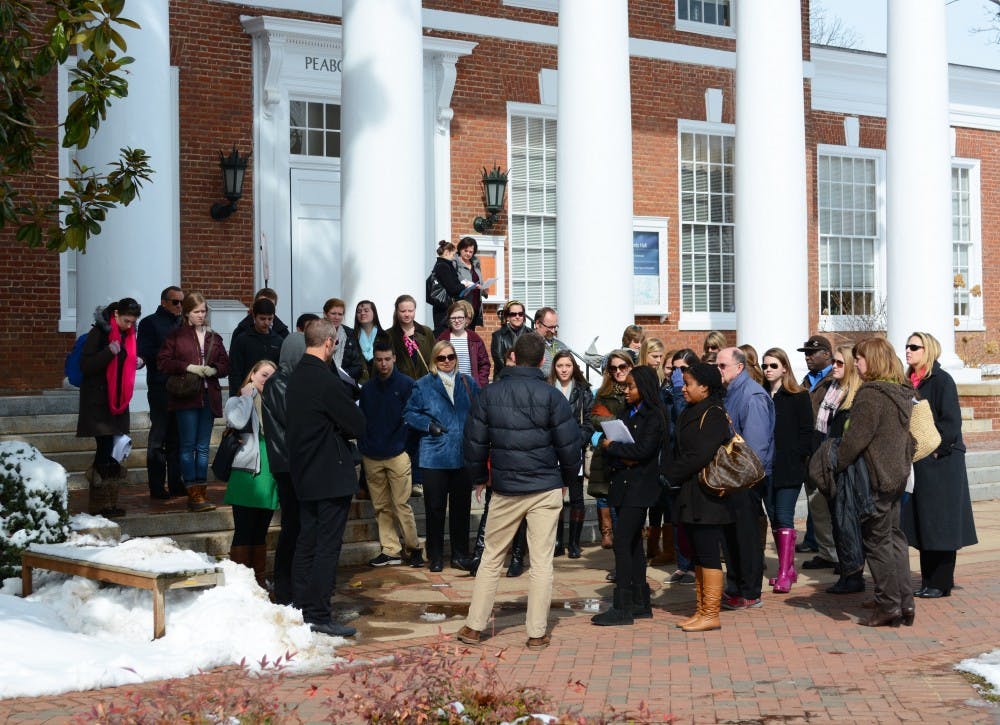Minority students make up 28.3 percent of the student body, according 2012-13 student demographic data. Aware of such numbers, the University Guide Service, the Monroe Society and the University Admissions Office make concerted efforts to welcome minority students to Grounds.
The Monroe Society provides free overnight stays for prospective students with first-year hosts. Prospective students are able to attend classes with their hosts and eat in the dining hall, said Isiah Manalo, a fourth-year College student and Monroe Society president of external affairs.
“Last year we worked with Julie Roa, the Program Coordinator for Hispanic/Latino, Native American, and Middle Eastern Student Services, to better provide for low socio-economic and minority students,” Manalo said in an email.
The Monroe Society underwent numerous changes to help address socioeconomic concerns after working with Roa. Manalo said the Society now stresses the prospective student’s comfort as one of the most important factors in how much high school students enjoy their visit to the University.
While the Monroe Society itself does not offer any special programs catered to minorities, Manalo said other organizations around Grounds do.
“For example, the Society of Hispanic Professional Engineers does Juntos Podemos, which hosts prospective high school students and shows them what engineering and college life is like,” Manalo said. “Additionally, the Office of Undergraduate Admissions does Spring Fling and Spring Blast, which are open houses for admitted African-American and Hispanic students, respectively.”
Making campus tours more inclusive has been a major focus when training new University Guides in the past year, said third-year College student Domenic Puzio, Guides speciality tours chair.
“Note here that our focus is not
in filling some quota of minority students.
[I]nstead, this is an awareness that we,
in our role of giving tours,
are weaker because we lack the perspectives
of minority students in our group.”
— University Guides Speciality
Tours Chair Domenic Puzio
“We want to craft tours that are welcoming to a broad variety of prospective students and that highlight our school’s diversity,” Puzio said in an email. “And when we discuss diversity, it’s not simply in terms of race; we want to express the incredible variety of interests at U.Va., whether your passion is artistic or nerdy or athletic or service-oriented. In short, we want to help prospective students of all backgrounds see that they can find their place here.”
On tours, guides discuss events, resources and organizations relevant to minority groups, Puzio said.
“On another note, we also discuss issues of race in our historical tours,” Puzio said. “We hear from speakers from Monticello that teach us ways to address the issue of slavery in our tours, and a large part of our training readings discuss Jefferson and his University’s views on slavery. ”
According to Puzio, Guides needs to improve its internal diversity to better give tours which welcome a variety of students to Grounds.
“Note here that our focus is not in filling some quota of minority students,” Puzio said. “[I]nstead, this is an awareness that we, in our role of giving tours, are weaker because we lack the perspectives of minority students in our group.”
University Dean of Admissions Gregory Roberts said his office reaches out directly to students from minority and underrepresented communities.
“We have an outreach division of the Undergraduate Admission office, and deans in this unit work closely with high schools and student populations from underrepresented backgrounds — hosting chats, phone call nights, and connecting prospects with faculty and U.Va. students.” Roberts said in an email.
Once on Grounds, minority students have the option to engage and support each other in a variety of student groups. Many of these core minority organizations, such as the Black Student Alliance and the Middle Eastern Leadership Council, are grouped under the umbrella of the Minority Rights Coalition.
The MRC is the student-run body which oversees seven minority organizations, including organizations representing gender and sexual minorities. The MRC works to support the organizations under its purview and help to plan their events.
“Our main goal is to increase awareness of the minority communities on Grounds,” said third-year Batten student Rebecca Kim, MRC vice president of administration.
In previous years, the MRC has solely been comprised of its executive board and the presidents of each of the seven member organizations. However, the group has recently added more members and established three committees — advocacy, event planning and publicity — as it works to become an organization of its own accord, though with the same goal of fostering cooperation between minority and non-minority groups.
Groups under the MRC spend significant time focusing on outreach and mentorship. The BSA, Latino Student Alliance, Asian Student Union and MELC all have mentorship programs in which first-year students are paired with older volunteers who help them adjust to college life.
One new minority mentorship organization is Black Scholars in Training, co-chaired by fourth-year College student Kaz Komolafe and first-year College student DeAnza Cook.
The group is interested in gathering black scholars on Grounds and helping them connect to research resources and successfully achieve academic goals.
Black Scholars in Training has developed a close relationship with the Office of African American Affairs, which acts as an academic advising and support service while aiding in leadership development within the University’s academic community.
“Just knowing how passionate I am, I wanted to form an organization for people who wanted to pursue goals of an academic nature,” Cook said.







